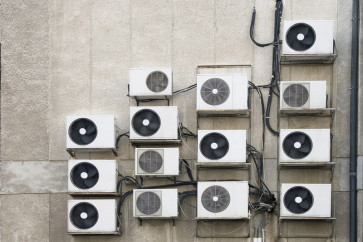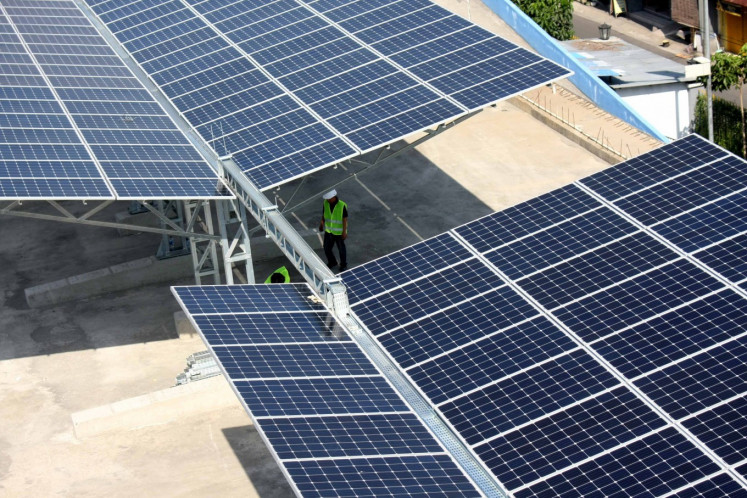Rupiah depreciation hurts demand for offices in CBD area
The sky is the limit: A high-rise office building under construction in the heart of Jakarta
Change Size

T
span class="inline inline-center">The sky is the limit: A high-rise office building under construction in the heart of Jakarta. The demand for offices in central business district (CBD) areas fell significantly in the third quarter partly due to the rupiah's depreciation, which made US dollar-based rent more expensive in the local currency. JP/R.Berto Wedhatama
The sharp depreciation of the rupiah against the US dollar had begun to hurt office markets in the central business district (CBD) area as many tenants prefer to rent offices in nonCBD areas, which offer lower costs.
Jones Lang LaSalle estimated the sluggish office-market condition in the CBD area would continue until the upcoming presidential election, which will be held next year, as investors would hold back their major business plans until the results of the election were announced.
Anton Sitorus, the head of research at a property consulting company, said that the rental rates for offices space, which are set in US dollars, had shown a significant increase in rupiah due to the sharp depreciation of the Indonesian currency against the greenback.
The rupiah depreciation had caused a decline in demand, especially for office space in the CBD area, he told reporters last week when announcing the company's quarterly report.
Although the lower demand had slowed the growth of the dollar-based rate, the depreciation of the rupiah cost the tenants more as they have to pay their rent in local currency, Anton said.
According to him, the dollar-based rental rate for the CBD only grew 2 percent in the third quarter as compared to about 6 percent in previous quarters.
The rupiah has plunged by about 15 percent this year due to the massive outflow of foreign funds from the country's debt and equity markets.

According to a recent survey conducted by Jones Lang La Salle, the estimated rent in the third quarter of 2013 for grade A CBD offices reached US$28.42 (Rp 329,640) per square meter (sqm) per month, $12.62 per sqm per month for grade B and $8.62 per sqm for grade C.
The survey indicated that net take-up (absorption) in CBD offices in the third quarter of 2013 dropped to 61,000 sqm from 92,000 sqm in the previous quarter of 2013 and from 90,000 sqm in the third quarter of 2012.
The survey showed that from January to September of 2013, new office supplied in the CBD reached about 290,000 sqm with occupancy rate of 92 percent.
The condition is slightly different with the office market in non-CBD areas. According to the company's quarterly report, the rent in nonCBD areas grew at a higher rate of 5.5 percent in the third quarter compared to the level recorded in the second quarter.
Jones Lang Lasalle's national director for strategic consulting, Vivin Harsanto, said that the demand for offices in the non-CBD areas continued growing in the third quarter due to their more competitive rents.
'The rental rate for offices in the non-CBD areas is not really affected by the economic condition. The landlords are more confident to raise their rents,' she said.
According to the company's survey, the estimated rental rate in TB Simatupang in South Jakarta, in the third quarter of 2013 reached Rp 150,000 per sqm per month; while the rent in other areas in South Jakarta was Rp 115,000 per sqm per month. In non-CBD areas in West, North and Central Jakarta, they estimated to reach between Rp 65,000 and Rp 70,000 per sqm per month and about Rp 50,000 per sqm per month in East Jakarta.
Meanwhile, the net take-up (absorption) for non-CBD offices was estimated to reach 39,000 sqm in the third quarter, rising slightly from 32,000 sqm in the previous quarter. As of September, the absorption for new offices in non-CBD areas was estimated to reach to 130,000 sqm with an occupancy rate of 93 percent.
Vivin said that the growing demand for the offices in non-CBD areas was caused by the improved quality of buildings and facilities offered by the landlords. This condition encouraged more companies to rent offices outside the central business area, she added.
The survey also indicated a slowdown in condominium sales, which dropped to 2,390 units in the third quarter from 4,300 units in previous quarter.
Meanwhile, the sale of condominiums from January to September 2013 was estimated to reach 11,000 units.
She said that Bank Indonesia's recent regulation to raise the minimum down payment for additional property purchases had also hurt the condominium market.
Vivin, however, estimated that despite the central bank's regulation and the decline in people's purchasing power due to the high interest rate, the sale of condominiums in the country would still be higher than those in previous years.
'Although the sales in the fourth quarter will likely remain the same compared to those in the third quarter, the total sales in 2013 will exceed the 2012 level,' she said.(tam)









